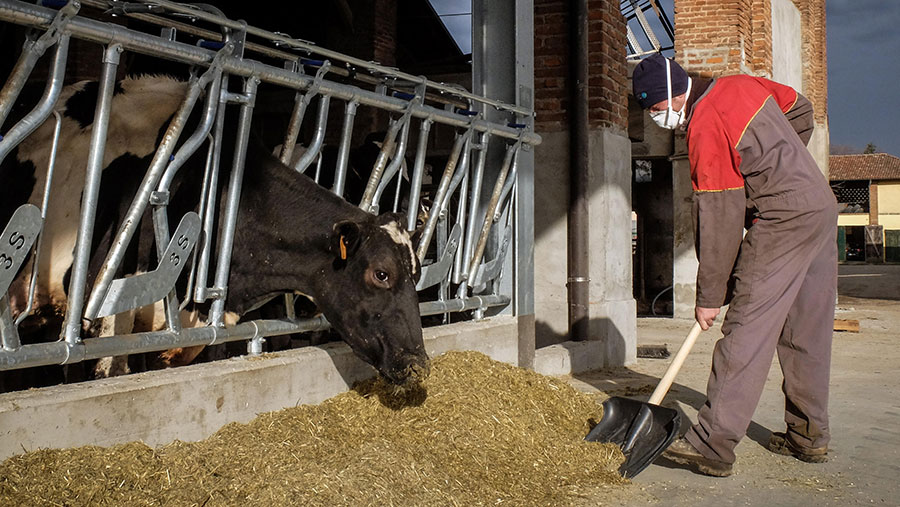Coronavirus: Farms advised to use face masks
 © Matteo Corner/EPA-EFE/Shutterstock
© Matteo Corner/EPA-EFE/Shutterstock Farm staff should be using face masks in many instances to limit the spread of coronavirus, says health and safety adviser Oliver Dale.
A mask will not necessarily prevent the wearer from being exposed to the virus, because it is so small that it can travel between the fibres of many masks.
“However, there is an increasing body of evidence to suggest that the virus can travel further in the atmosphere than previously thought, and particularly so where it is projected by a cough or sneeze,” says Mr Dale, managing director of consultancy Safety Revolution.
The small droplets expelled from a cough or a sneeze may travel for up to six metres and may also hang in the air as micro-droplets for long periods.
Wearing a mask may restrict the projection of these droplets and so cut the amount of virus in the atmosphere, reduce its travel distance and potentially the volume expelled.
See also: Coronavirus advice for managing and keeping staff safe
Masks on farm – when and how?
- Masks should be introduced for staff working in close proximity to others or to contractors – close proximity in this case is less than six metres.
- They should be worn where vehicles or equipment are used or may be shared (even where decontamination and hygiene procedures are being practised).
- Mask specification should be FFP3 or FFP2, generally available from the usual farm suppliers.
- While all staff should be equally protected, employers should take care to ask workers if they have underlying health conditions which make them more vulnerable to other illnesses. Older workers are more likely to have existing respiratory conditions.
- Do not reuse or share masks.
- If availability is an issue, home-made masks could be used in certain circumstances where the main aim is to reduce droplet spread from the wearer. However, these should never be used as a substitute for appropriate protection for certain jobs such as cleaning grain stores or bedding stock, when appropriate industry-standard equipment should be used.
- Soiled or damaged masks must be disposed of in a manner that avoids cross-contamination.
- Ensure staff follow basic good hygiene practices as advised by the government.
Source: Safety Revolution
Wearing a mask also restricts the wearer from touching their nose and mouth, and so reduces the likelihood of them transferring any virus from their hands to those parts of their body where it may be more readily absorbed.
“In a workplace environment, employers have a duty to introduce all reasonably practicable measures to control the spread of the virus, regardless of any other guidance that may be issued to the general public in relation to their day-to-day contact,” says Mr Dale.
“This is a workplace health-and-safety issue and the provision and use of masks would be regarded as ‘reasonably practicable’, so employers should give this careful consideration,” he advises.
“Consider your own risk assessments in conjunction with government guidelines on physical distancing. Such masks form part of what is known as respiratory protective equipment (RPE).
Additional RPE may be required for certain workplace activities such as grain store cleaning.
As well as the legal obligation of the employer to ensure safe working conditions, employees also have a personal duty under the Health and Safety at Work Act to take care of their own health and safety, as well as that of others who may be affected by their actions at work.
This includes the specific risks to the business and their colleagues as a result of any failure to adhere to government guidelines.
